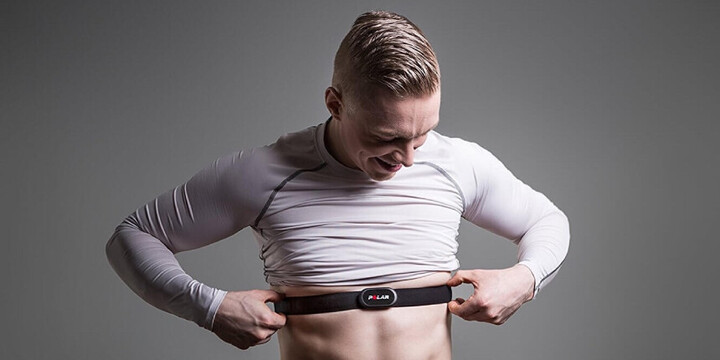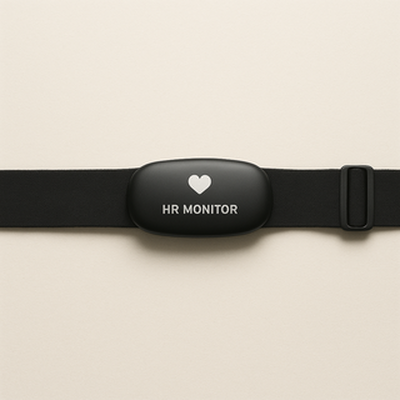Chest Strap HR Monitor: Complete Simple Guide
Body
A chest strap HR monitor, or heart rate monitor, is a small electronic device you wear around your chest to track your heart rate. It is used by athletes, gym lovers, and even regular people who want to check their heart health. The device works by sensing the electric signals your heart gives off when it beats. It then sends this data to your phone, watch, or fitness device through Bluetooth or ANT+.
Unlike wrist-based heart rate monitors, chest strap monitors are more accurate. This is because they are placed close to your heart and can catch each beat clearly. That’s why many fitness trainers, sportspeople, and even doctors prefer using them.
In today’s world, people are more focused on their health and fitness. They want to know how fast their heart is beating during a run, workout, or even rest. The chest strap HR monitor helps with that. It gives real-time updates so you can train better and smarter.
In this article, we will talk more about the chest strap HR monitor in a simple way. You will learn how it works, its benefits, how to choose the right one, and tips to use it properly. If you are new to fitness or already training hard, this guide is perfect for you.
How Chest Strap Monitors Work
Chest strap heart rate monitors work in a simple yet smart way. They use something called electrocardiography (ECG or EKG) to measure the electric activity of your heart. When your heart beats, it sends out an electric signal. The sensor in the chest strap catches this signal. Then, it sends the data to your mobile phone, smartwatch, or fitness equipment.
The strap is made of soft material and has electrodes built into it. These electrodes touch your skin directly and sense the heart's signals. The device usually has a small module in the center of the strap. This module contains the battery and wireless technology like Bluetooth or ANT+.
Once connected to your app or smartwatch, the strap starts sending data every second. This helps you see how fast your heart is beating in real time. You can also track changes during different activities like walking, running, biking, or lifting weights.
The main reason chest strap monitors are trusted is their high accuracy. Wrist monitors often give wrong readings, especially when you move your arms too much or sweat heavily. But chest straps stay in place and catch the heart’s signal directly, which gives very reliable results.
To use it, you simply wear the strap snugly around your chest, just below your chest muscles. Make sure the strap is not too tight or too loose. You can lightly wet the electrodes before wearing it. This improves contact with the skin and gives more accurate readings.
Key Benefits Of Using Chest Strap HR Monitor
Using a chest strap heart rate monitor gives many benefits. Whether you're just walking or training for a marathon, this small tool can make a big difference. Let’s look at the main advantages:
1. Accurate Heart Rate Reading
Chest strap HR monitors are the most accurate wearable heart rate devices. Because they sit close to your heart, they read every beat correctly. This is useful for serious training or when you need to monitor your heart health carefully.
2. Real-Time Feedback
You can see your heart rate instantly while working out. This helps you know if you're in the right zone – fat burn, cardio, or peak. Staying in the right zone helps you get better results and avoid overtraining.
3. Better Workout Planning
With heart rate data, you can plan your workouts better. You can set targets, measure progress, and avoid pushing yourself too hard. Many fitness apps use your heart data to make personalized training plans.
4. Health Monitoring
Chest straps can show how your heart reacts to stress, workouts, or rest. This is useful for people with heart issues or those who want to live healthier lives. Some even use it to track recovery after surgery or illness.
5. Works With Many Devices
Most chest strap monitors connect to phones, smartwatches, fitness apps, or gym machines. This makes them easy to use with your existing gadgets. You don’t need to buy extra tools.
In short, a chest strap HR monitor is like having a fitness coach on your chest. It helps you train smarter, stay safe, and reach your goals faster.
How To Choose The Right Chest Strap
Choosing the best chest strap HR monitor depends on your needs, budget, and how you plan to use it. Here are the things to check before buying:
1. Compatibility
Make sure the chest strap connects well with your smartphone, fitness app, or smartwatch. Look for Bluetooth or ANT+ support. Some popular brands work with both Android and iPhone devices, as well as Garmin, Polar, or Apple Watches.
2. Accuracy
Not all chest straps are the same. Some cheaper ones may miss beats or give wrong data. Read reviews, check ratings, and go for trusted brands like Polar H10, Garmin HRM-Pro, or Wahoo TICKR.
3. Comfort And Fit
You’ll wear the strap during workouts, so it should be comfortable. Look for soft, stretchy straps that adjust easily. The strap should sit snugly but not too tight on your chest.
4. Battery Life
Some monitors have long battery life (over 300 hours), while others need charging more often. Choose one that matches your workout routine. If you don’t like changing batteries, go for a rechargeable one.
5. Waterproof Feature
If you sweat a lot or swim, choose a waterproof model. Not all straps are safe for water use, so check the label first.
6. App Support
A good monitor should work with popular fitness apps like Strava, Zwift, or MyFitnessPal. Some brands have their own apps with great features like graphs, zones, and training feedback.
Think about how often you’ll use it and what kind of workouts you do. Don’t just pick the most expensive one. Choose the one that fits your body and fitness style.
Tips To Use It Effectively
Getting the most from your chest strap HR monitor means using it the right way. Here are some useful tips for best results:
1. Wear It Correctly
Place the strap right under your chest muscles. It should sit flat against your skin. Adjust the strap so it’s snug but not uncomfortable. If it slips, your reading will be wrong.
2. Wet The Electrodes
Before wearing the strap, lightly wet the two electrodes. This improves contact with your skin and helps get accurate readings from the start.
3. Connect With Your Device
Pair the strap with your phone, watch, or app. Make sure Bluetooth or ANT+ is turned on. Most devices show a message when pairing is complete.
4. Start Your Workout
Once connected, start your workout as normal. You’ll see your heart rate in real-time. Some apps also show zones like warm-up, fat burn, cardio, and peak.
5. Clean After Use
After every use, remove the strap and rinse it with clean water. Sweat can damage it over time. Let it air dry. Do not machine wash unless the manual says it’s safe.
6. Track Your Progress
Use the data to track your fitness over time. See how your heart responds to different workouts. This helps you improve and stay motivated.
When used properly, your chest strap HR monitor becomes a powerful fitness partner. It helps you stay focused, avoid injuries, and get real results.
Best Chest Strap HR Monitors 2025
Here are some of the best chest strap HR monitors in 2025 that are loved by users worldwide:
1. Polar H10
-
Super accurate
-
Long battery life (400 hours)
-
Works with many devices
-
Comfortable and waterproof
2. Garmin HRM-Pro
-
High-quality readings
-
Advanced metrics like running dynamics
-
Connects to Garmin watches easily
-
Good for swimmers too
3. Wahoo TICKR
-
Lightweight and simple
-
Bluetooth and ANT+ support
-
Syncs with popular fitness apps
-
Affordable and easy to use
4. Coospo H6
-
Budget-friendly
-
Decent accuracy
-
Pairs with many devices
-
Good for beginners
5. MyZone MZ-3
-
Gamified workout experience
-
Cloud-based data storage
-
Tracks calories, zones, and effort
-
Great for group training
Each of these has its pros and cons. Read user reviews and compare features before buying. If you're new, start with a simple and reliable option like Wahoo or Coospo. If you're an athlete, go for Polar or Garmin.
Who Should Use A Chest Strap?
A chest strap HR monitor is not just for athletes. Many people can benefit from it. Here’s a look at who should use it:
1. Runners And Cyclists
If you run or cycle often, tracking your heart rate helps improve your stamina. You can measure your effort, track zones, and avoid burnout.
2. Gym Lovers
Weightlifters and fitness lovers can use heart rate data to see how intense their workouts are. This also helps with better recovery and fat burning.
3. People With Health Issues
If you have heart problems or are recovering from illness, your doctor may suggest using a chest strap to monitor your heart safely during light activity.
4. Beginners In Fitness
New to exercise? A chest strap helps you understand how your body reacts. You can avoid pushing too hard and build up slowly.
5. Sports Teams Or Trainers
Trainers use chest straps to monitor team performance. It gives them real-time data to adjust training and prevent injuries.
No matter your fitness level, a chest strap HR monitor gives helpful insights. It’s a small device, but it makes a big impact on your fitness journey.
Conclusion: Small Strap, Big Difference
The chest strap HR monitor may look small, but it can do wonders for your health and fitness. It gives real-time, accurate heart rate data that helps you train smarter and safer. From runners to regular gym-goers, everyone can benefit from it.
It’s not just about numbers. It’s about understanding your body better. You can work out in the right heart zone, prevent injuries, and reach your goals faster. Just make sure you choose the right strap, wear it correctly, and track your progress.
If you're serious about fitness or just starting, investing in a good chest strap HR monitor is one of the best decisions you can make.
FAQs: Chest Strap HR Monitor
Q1. Are chest strap heart monitors safe?
Yes, they are very safe to use. They only read the signals your heart naturally sends. They don’t send anything into your body.
Q2. Can I wear a chest strap all day?
You can, but it's not made for long use. It’s best for workouts. For daily tracking, a smartwatch is more comfortable.






Comments